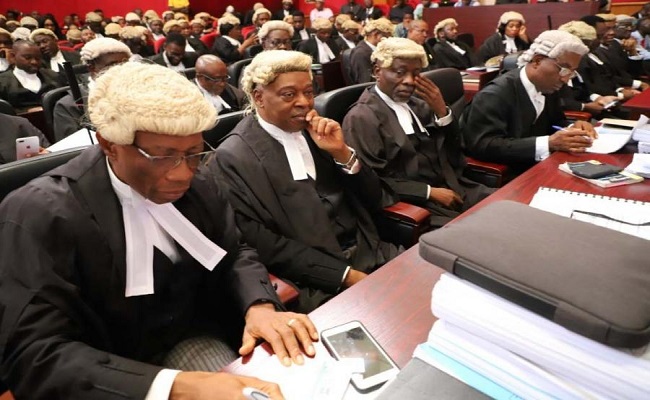The Presidential Election Petition Tribunal is expected to later today, rule on the objection by the Independent National Electoral Commission, Presid
The Presidential Election Petition Tribunal is expected to later today, rule on the objection by the Independent National Electoral Commission, President Muhammad Buhari, and the All Progressives Congress, to play a video evidence at the hearing of their petition challenging the outcome of the February 23, 2019 poll on the request of the Peoples Democratic Party and Alhaji Atiku Abubakar.
The five-man tribunal led by Justice Mohammed Garba has gone on its routine one-hour break after entertaining arguments from the lawyers and will return to deliver its ruling after the break.
The PDP and his presidential candidate at the poll, Atiku, are by their petition, challenging the victory of Buhari and the APC at the poll. The petitioners’ lawyer, Chief Chris Uche (SAN), had earlier on Monday presented three witnesses, and then he introduced the media adviser and spokesperson for Atiku, Mr. Segun Showunmi, as the petitioners’ next witness to be presented.
He also indicated that there would be the need to play a video clip to the tribunal in the course of Showunmi’s testimony. He went on to tender 48 documents including video compact discs scheduled to be played at the Monday’s hearing. Showunmi is the petitioners’ 40th witness. Counsel for the three respondents – Yunus Usman (SAN) for INEC, Alex Izinyon (SAN) for Buhari, and Adeniyi Akintola (SAN) for APC – in turn, opposed the application to play the video clips.
They also objected to the admissibility of the entire 48 proposed exhibits. But Justice Garba, who leads the five-man tribunal, said it was part of the agreement reached among parties to the case that objection to the admissibility of any exhibit would only be indicated and the reasons given at the final address stage, without allowing it to stop the admission of the exhibit pending the final hearing stage.
But the respondents’ lawyers insisted that the video evidence were not part of such exhibits covered by the pre-hearing agreement. They also said the video evidence were not frontloaded along with other exhibits accompanying the petition. They described it as an ambush, and that they would be prejudiced, if the ruling on their object would have to wait till the final judgment in the case.
“The documents do not comply with Paragraph graph 4(4)(6)(c) of the First Schedule to the Electoral Act, 2010 (as amended). This is a great ambush. Akintola added that in addition to opposing the admissibility of the documents, he also objected to “the procedure being adopted by the petitioners,” Usman said.
He said Paragraph 5 of the First Schedule to the Electoral Act made it mandatory for the proposed exhibits to be frontloaded. He said, “Everything ought to be frontloaded. These are not documents from the official portal of INEC. They are amending the petition behind.”
But the petitioners’ lawyer, Uche, said the issue of ambush did not arise, as the respondents had been long aware of the exhibits. He said, “As we agreed in the pre-hearing report, the schedule of documents to be relied on was duly filed and served. That has not been contested. With the pre-hearing report, the petitioners are in order to tender the documents, and the respondents are in order to object, but their objection would not constitute a stumbling block at this stage of the proceedings because election petitions are ‘suis generis’ (in class of their own).”
